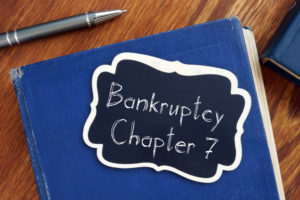6 Things That Happen After Filing Chapter 7 Bankruptcy

When considering your debt relief options, you may wonder what happens after you file bankruptcy. Bankruptcy is a legal process that sets off a chain reaction of events. Some of these events are to protect you while others are to protect creditors.
With over 20 years practicing entirely in bankruptcy and handling over 9,000 cases for both individuals and businesses, the experienced bankruptcy attorneys at Sasser Law Firm understand how confusing the bankruptcy process can be. Our team has prepared this brief list of what happens after filing chapter 7 bankruptcy.
We can also discuss what to do after filling chapter 7 during a confidential consultation you can arrange by calling (919) 319-7400 or contacting us online.
-
You Will Be Assigned a Bankruptcy Trustee
A bankruptcy trustee will be assigned to oversee your filing. The bankruptcy trustee administers your estate, will examine your paperwork, and either presides at and/or ask questions at the meeting of creditors.
-
Automatic Stay Goes into Effect
One of the best things that happens after filing for chapter 7 bankruptcy is that an automatic stay goes into effect. This stay halts creditors from taking further action to collect against you, including:
- Beginning or continuing legal proceedings against you
- Creating, perfecting, or enforcing a lien against your property
- Contacting you by phone or mail
- Foreclosing on your home
- Repossessing your property
- Garnishing your wages
- Levying your bank accounts
-
The Creditor Meeting Is Scheduled
The creditor meeting is a hearing that your bankruptcy trustee holds where he or she asks questions about your property, financial circumstances, and bankruptcy paperwork. It is usually the only time you have a meeting. This is not court and there is no judge present. Your bankruptcy attorney attends the meeting with you. Creditors have the right to attend the meeting, but they usually don’t.
-
You’ll Receive Reaffirmation Agreements
You might receive reaffirmation agreements from creditors asking you to reaffirm the debt so that it is not discharged during the bankruptcy process. If you are hoping to keep your home or car that is currently encumbered, your bankruptcy attorney may recommend signing these agreements.
-
You Take A Personal Financial Management Course
You will be required to complete a personal financial management course before you receive your discharge. This course is in addition to the credit counseling you took before filing your petition.
-
You Receive Your Discharge
Finally, you will receive your discharge. Most types of debt can be discharged through a chapter 7 bankruptcy, with a few exceptions like taxes, domestic obligations or child support. Your discharge gives you a fresh start and removes the legal obligation for you to repay any of the discharged debt.
Contact an Experienced Chapter 7 Bankruptcy Attorney Today
If you would like to know more about what to do after filing chapter 7 or would like to discuss whether chapter 7 is a good resolution for you, the team at Sasser Law Firm is ready to help. We have four experienced bankruptcy attorneys who understand the intricate details surrounding a bankruptcy filing.
We can guide you through this process and ensure that you have all the information you need to make an informed decision. You will work directly with an attorney when you retain our services Learn more by calling us at (919) 319-7400 or contacting us online.
- About the Author
- Latest Posts
For more than 20 years, the Sasser Law Firm has been helping individuals and business owners sort through financial hardships to see the light at the end of the tunnel. Our North Carolina bankruptcy attorneys are all board-certified specialists, which means we have passed a complex exam, undergone a thorough peer review, and continue to earn legal education credits in this ever-evolving area of law.














